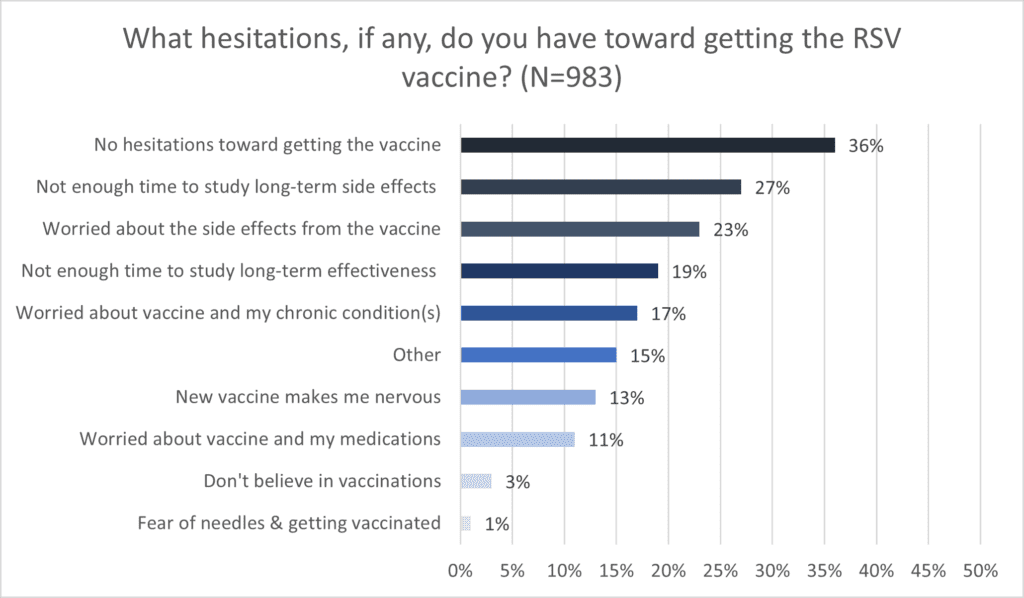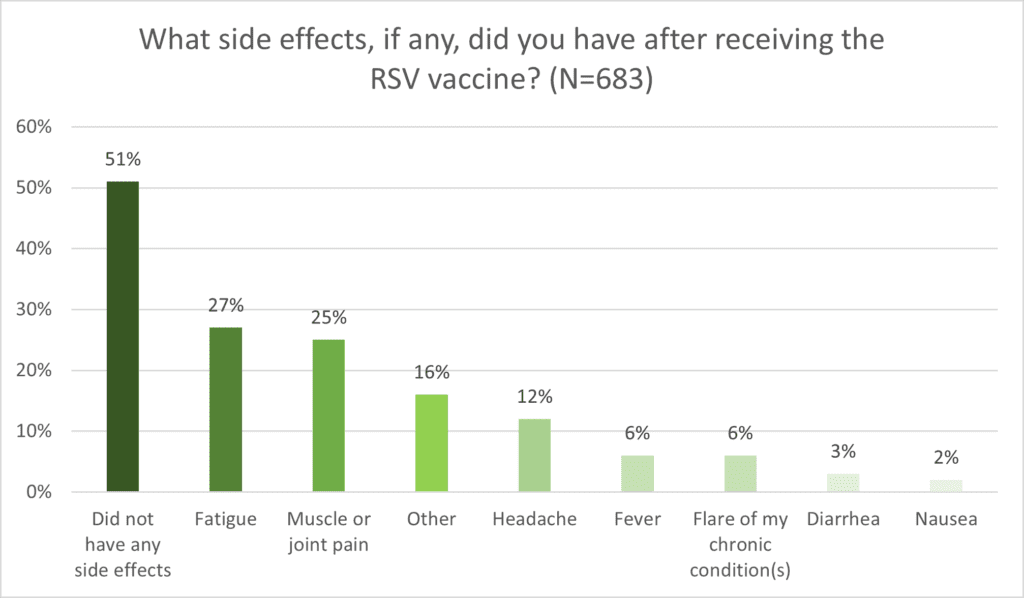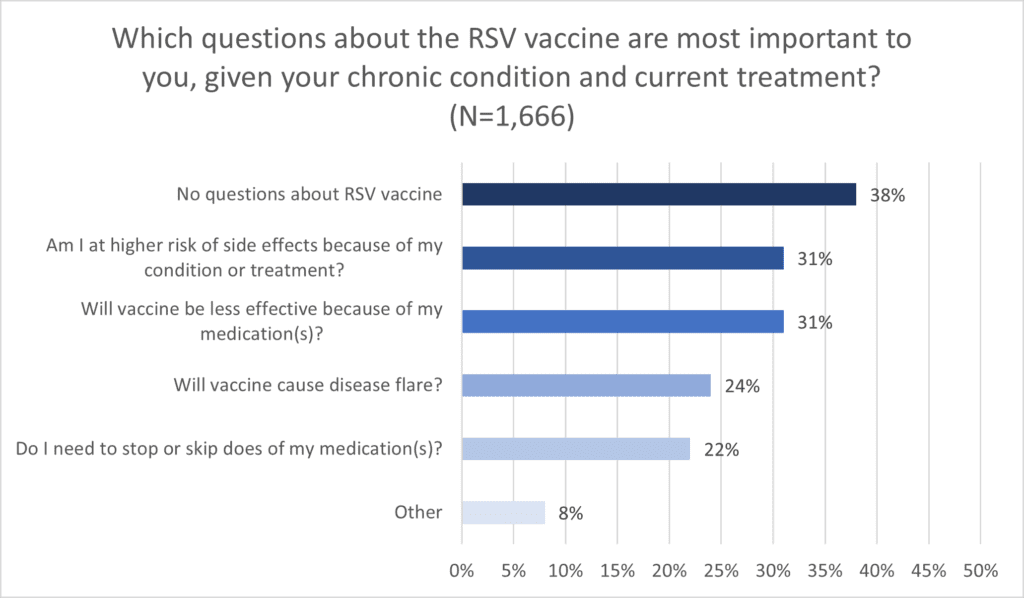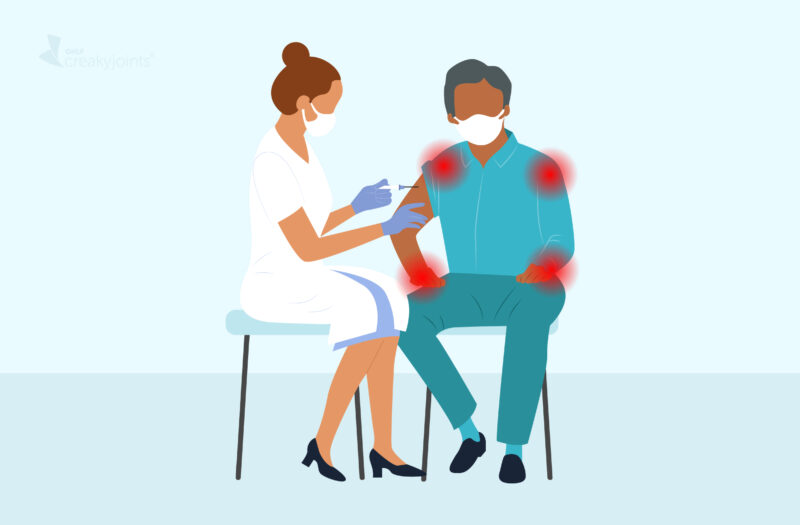Learn more about our FREE COVID-19 Patient Support Program for chronic illness patients and their loved ones.
Respiratory syncytial virus (RSV) is a virus that causes cold-like symptoms and is more serious in babies, older adults, and people with weakened immune systems. RSV is seasonal, typically starting in the U.S. during the fall and peaking in the winter.
Earlier this year, the U.S. Food and Drug Administration (FDA) approved the first RSV vaccine in the U.S. The RSV vaccine is recommended for adults ages 60 and older and infants.
While the RSV vaccine is not yet approved for people with weakened immune systems, we do know that RSV infections can be more serious in this population. After asking about your COVID and flu vaccination plans, we received many questions about the RSV vaccine, including its necessity and potential side effects. To address these concerns, we conducted a poll to learn more about our community’s thoughts on and plans for the RSV vaccine.
Due to age qualifications for vaccine eligibility, participants were screened out of the survey if they were under 60 years old. Of the 1,666 respondents, 41 percent have received the RSV vaccine this year.
Here are other key learnings and insights from the poll.
Planning, Lack of Doctor Recommendation, and Awareness
For the 59 percent that have not gotten the vaccine, we sought to learn more about why not. Many (30 percent) said they plan to get the RSV vaccine this year, they do not want to get the RSV vaccine (20 percent), and their doctor did not recommend it (18 percent).
About 20 percent selected other and elaborated in the free-response section. The main themes that emerged were that they did not know about it and they have to schedule around other vaccines or medications.
Some even responded that they have plans to ask their doctor at their next visit:
- “I plan to get the vaccine, but haven’t spoken to my doctor yet.”
- “I want to talk to my doctor first as I already received multiple vaccines this year.”
- “I’m waiting to speak with my rheumatologist this month.”
- “Physician away and want to discuss with him.”
- “Plan to discuss with my doctor.”


Hesitations Regarding Vaccine Side Effects
We also wanted to learn more about people’s hesitations toward getting the RSV vaccine. Thirty six percent said they do not have any hesitations. For those with concerns, participants were able to select all that apply:
- 27% said there hasn’t been enough time to study the long-term side effects of the vaccine.
- 23% worried about the side effects from the vaccine.
- 19% felt there hasn’t been enough time to study the long-term effectiveness.
- 17% worried about getting a vaccine because of their chronic condition(s).
- 13% said a new vaccine makes me very nervous.
- 11% worried about getting a vaccine because of the medication(s) they take for my chronic condition(s).
- 3% do not believe in vaccinations in general.
- 1% have a fear of needles and do not like getting vaccinated.


More than half of respondents who got the RSV vaccine did not experience any side effects
For those who did experience side effects, participants were able to select all that apply:
- Fatigue: 27%
- Muscle or joint pain: 25%
- Other: 16%
- Headache: 12%
- Fever: 6%
- Flare of chronic condition(s): 6%
- Diarrhea: 3%
- Nausea: 2%
The most common response for other was injection site reactions, including soreness and pain on the arm.


How Chronic Illness Affects RSV Vaccine Experience
Finally, we wanted to learn more about what questions our community has about the RSV vaccine so we can continue to provide educational resources that meet their needs. Thirty eight percent had no questions about the RSV vaccine.
For those who did, participants were able to select all that apply:
- 31% wonder am I at higher risk of vaccine side effects because of my condition and/or treatment.
- 31% asked whether the vaccine is less effective because of the medication(s) I take.
- 24% asked if the vaccine can cause me to have a disease flare.
- 22% inquired about the need to stop or skip a dose of immunosuppressant medication(s).
The Global Healthy Living Foundation is committed to providing ongoing education about COVID-19 vaccines for the chronic illness and immunocompromised community.
To stay informed about the latest COVID-19 vaccine news for people who are immunocompromised, take immunosuppressant medications, or have autoimmune conditions, follow all of our COVID-19 vaccine coverage here.
About the Patient Support Program Quick Poll
Members of our program have underlying health issues — such as inflammatory arthritis and other autoimmune conditions, heart disease, lung disease, diabetes, and more — that may increase their risk for COVID-19 complications. They are interested in understanding the best ways to stay safe during the pandemic and to be part of a community of people with similar concerns, questions, and fears.
We regularly poll members, who live in the U.S. as well as around the globe, about a variety of topics, including how the pandemic is affecting their lifestyle, mental health, chronic disease management, medication adherence, and more.
We use this information to inform the educational resources we provide and to inform other stakeholders — such as public health experts, policymakers, advocacy groups, health care professionals, and pharmaceutical companies — about chronic illness patients’ needs and concerns. You can participate in ongoing poll by joining the support program here.






